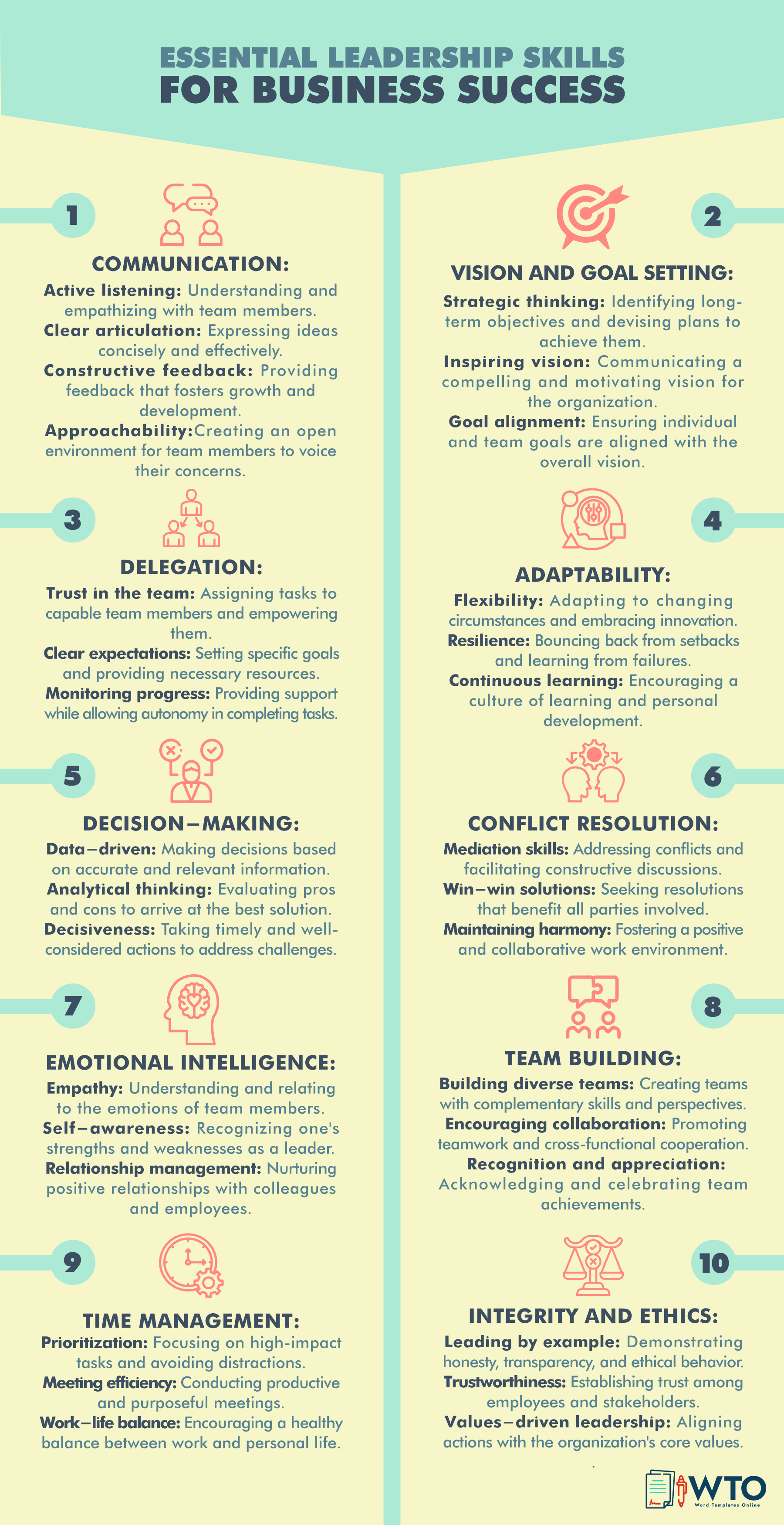Many employers seek leadership skills among their candidates, especially if hiring them for leadership roles. Considering that leaders are responsible for building effective teams and ensuring all work tasks are successful, excellent leadership skills are among the most valuable assets of every leader. However, strong leadership skills can benefit all job positions within a business.
Leaders with excellent leadership skills can communicate well, delegate and handle responsibilities, organize tasks and teams to reach goals, collect feedback, motivate their team, and solve problems in the workplace.
To do that, they need strong communication, interpersonal, motivational, decision-making, and problem-solving skills. So having strong leadership skills means having a combination of several different skills.
Some examples of these skills include:
- Active listening
- Communication
- Creativity
- Dependability
- Effective feedback
- Empathy
- Flexibility
- Patience
- Positivity
- Reliability
- Risk-taking
- Teaching and mentoring
- Team building
Leaders can inspire employees, boost engagement, improve retention, remove obstacles, and support a positive environment with leadership skills. Leadership quality is essential for an organization’s overall success since it can lead to higher performance, higher customer satisfaction, more productivity, improved quality, and increased financials.
With many experienced leaders reaching their retirement years, organizations worldwide are predicting a shortage of skilled leaders in the future. That is why companies are ready to invest big in strong leaders.
Nevertheless, present-day leaders need a different set of competencies than previous leaders. So, whether you are applying for an entry-level position or already climbing the career ladder, listing your leadership skills could be one of your critical assets.
How to Identify Your Leadership Skills
Every leader works and functions differently, so there is no single best way to perform leadership duties. Identifying leadership skills can take time and effort, but the process leads to outstanding results.
Here is how to identify your leadership skills:
Through self-studying, leaders can learn which leadership styles are preferred for different situations. In addition, self-studying can help them identify the unique leadership skills that will allow them to solve problems, issues, and concerns.
Sometimes, self-studying is not enough to identify the core leadership skills, which is when leadership courses and training programs become helpful. Online courses are excellent for identifying essential leadership skills more flexibly, but in-person training programs often secure more effective results.
Some employees do not have access to many leadership opportunities in the workplace. By finding leadership activities outside work, aspiring leaders can test their leadership skills and decide which leadership style suits them best. From joining a book club to joining a sports team, there are many ways to find external activities that can help you identify your leadership style.
Finally, aspiring leaders can learn a lot by studying the leadership styles of people they admire. Observing industry leaders and noting specific qualities that make them successful can help future leaders determine what kind of a leader they would like to become.
How You Can Build Your Leadership Skills
Leadership skills are buildable; all you need is the right set of tactics and tools that will allow you to develop them. Here are the five crucial steps to build leadership skills:
Step 1: Take initiative
The critical responsibility of every successful leader is taking the initiative. To become a leader one day, one must look beyond the given tasks and examine the company’s bigger picture. That includes considering the company’s long-term benefits and results. To do that, brainstorm ideas and think of ways to contribute to the company besides completing your daily duties.
Step 2: Find resources
Aspiring leaders can find immense amounts of valuable resources to help them develop their leadership skills. Books, online courses, podcasts, workshops, training programs, and numerous other resources are available to all individuals who wish to refine their skills in leadership.
Nearly all (85%) executives participated in some leadership development program, including online training, classroom learning, one-on-one mentoring, or job shadowing. This shows how crucial further education and development are for leaders who want to achieve great things.
Step 3: Request more responsibility
After working for an organization for some time, individuals who want to progress should not be afraid to ask for more work or responsibility from their managers. Let your manager know you would be happy to take some work off their to-do list or participate in a new project. By taking this step, leaders show they are eager to progress and participate in more activities in addition to their original work scope.
Step 4: Target specific skills
Leadership is a blend of several different skills. Therefore, it is essential to determine your success in each of them to target specific skills you need to improve.
To develop a specific skill, you must create a plan to focus on its improvement. Try reading skill-development books, talking to colleagues and managers, or finding a mentor.
Step 5: Find leadership activities outside of work
Not all aspiring leaders get an opportunity to work on their leadership skills while performing their daily tasks. If that is the case, you should look for leadership activities outside work. Consider organizing outside-of-work activities with co-workers or joining a club or community where you can showcase and perfect your leadership skills.
Top 12 Essential Leadership Skills Examples
There are 12 essential leadership skills every leader should possess and continually develop. Regardless of the workplace or the industry you work in, these top 12 skills will ensure you are equipped for every situation you might encounter as a leader:
Self-development
Since leaders are responsible for making important decisions, they also need to set some time to focus on themselves and their self-development. For self-development, leaders need to understand their strengths and weaknesses. Doing so helps improve their skills and equips them better for future situations.
Ethical practice and civic-mindedness
Ethics and civic-mindedness are essential to every leadership strategy because they affect the team’s culture. Many businesses create written policies that outline the basics of ethical practice and civic-mindedness. However, leaders are responsible for using these policies whenever an ethical situation arises. When leaders focus on doing the right thing, their team will follow their example.
Integrity and trustworthiness
Integrity is one of the critical characteristics of every successful leader. It means standing by a set of strong values – even when no one is watching. Leaders with a strong sense of integrity help businesses make the right choices and ensure companies maintain a positive brand image.
Furthermore, trustworthy leaders encourage employees to ask questions or voice concerns. Being open and honest with employees inspires the same qualities in them.
Responsibility and commitment
True leaders take responsibility for their team’s successes and failures, so they must take responsibility for all actions done by them or their team. Unfortunately, leaders unable to do that usually blame others, which is why they often lose other employees’ respect.
Commitment enables leaders to complete initial plans regardless of the obstacles that might appear along the way. Even when everything seems to be going in an unfavorable direction, committed leaders will find a way to meet deadlines, keep employees motivated, and achieve desired results. Employees value leaders who show exemplary commitment and will do more to match them.
Conflict management
Conflicts can happen anytime and anywhere, including the workplace. Since leaders are responsible for their teams, they should also work on resolving any disputes among employees, customers, suppliers, or competitors. An effective leader always has techniques and solutions to mitigate a potential conflict. If they engage as soon as possible, they can efficiently resolve the issue before it negatively affects the business.
Critical thinking and problem-solving
Being a leader is a challenging vocation. However, all leaders must make critical decisions that affect the entire company and solve the problems that arise in the workplace.
Critical thinking allows leaders to think coherently, build logical connections between ideas, and reach rational conclusions. In addition, critical thinkers are highly analytical, which makes them excellent decision-makers. They can determine which ideas lead to the best outcomes and easily recognize errors or inconsistencies.
Problem-solving enables leaders to tackle any business issue and develop a step-by-step solution that keeps everyone calm. As a result, they can lead the business correctly with elaborated critical thinking and problem-solving skills.
Creativity and innovation
Since leaders must make many critical decisions, they often need to think outside the box – a process that requires creativity and innovation.
Sometimes, traditional methods or solutions do not lead anywhere, which is where leaders need to get creative. They cannot always choose the conventional path if they want to succeed. Creative solutions can help companies reach new levels of success.
Similarly, innovation helps leaders try something new, often leading to improved methods and ideas. Leaders should encourage creativity and innovation among their employees to improve their skills and performance, making them better business contributors.
Communication and team building
Communication skills are essential for clearly explaining tasks, missions, and goals. In addition, strong communication skills are necessary for a comfortable atmosphere and transparent communication.
Communication does not include only verbal but also nonverbal, written, and online communication, presentation, and active listening. In addition, quality leaders must master one-on-one and full-staff communication and phone, chat, email, video, and social media interactions.
Besides communication, leaders need to take good care of their team. Team-building skills ensure leaders invest in developing their team members and fostering healthy relationships with them.
Motivation and ability to mentor
Leaders should be some of the most inspiring figures for their employees. They must exceed requirements, surpass expectations, and pay attention to all the factors that might affect the business’s success because they are primarily responsible for the motivation of their team.
Leaders can increase employee motivation by introducing rewards, recognizing the effort and input of employees, or increasing their investment in the business.
Moreover, leaders must mentor employees and help them grow their careers. Through teaching, leaders learn more about their employees and find ways to make their teams more successful.
Delegating
Leaders cannot complete all the tasks independently, so they must learn the craft of delegating. Delegating is so much more than simply assigning different tasks to employees. Strong delegation skills help leaders decide which tasks to assign to specific employees to achieve the best results.
Agility and adaptability
Last-minute changes happen daily. Leaders must be flexible enough to adapt to newly formed situations and accept possible changes. That will sometimes require leaders to work outside their comfort zone, but agility and adaptability give businesses a competitive edge.
Decisiveness
Decisiveness helps leaders make rational decisions even when under a lot of pressure. Decisions ultimately dictate the business’s success, so leaders must always hold to them.
Leaders cannot always make the decisions that will keep everyone happy. Sometimes, employees will not agree with certain decisions that have been made, but leaders are responsible for finding solutions that are better for the team and the firm in the long run.

How Can You Showcase Your Leadership Skills?
Prospective leaders can choose from three ways to showcase their leadership skills – on a resume, in a cover letter, and during a job interview.
Leadership skills for a resume
Including leadership skills in a resume is essential if you apply for a position that requires them. You can mention leadership skills in the skills section.
EXAMPLE
Skills: Leadership, communication, conflict resolution, negotiation, mentoring
You can also include your leadership skills in the achievements section by highlighting essential goals or awards.
EXAMPLE
- Achieved a 35% production rate above goal (2014)
- Won “Company Leader and Mentor Award” (2016, 2018)
Leadership skills for a cover letter
A cover letter is another excellent opportunity where prospective leaders can highlight their leadership skills. In the cover letter, candidates can elaborate on their leadership skills and describe what outcomes they have achieved by using those skills.
Leadership skills for an interview
It is never a bad idea to mention leadership skills in an interview. First, however, prepare to give examples of your leadership skills that prove your competencies.
How Can Graduate Studies Improve Your Leadership Skills?
Higher education plays a vital role in helping individuals improve their leadership skills. Throughout graduate studies, future leaders can work on their leadership skills in many ways:
- Firstly, graduate tasks sharpen analytical and critical thinking – two essential skills of every quality leader. Leaders can do their job well by creating arguments, defending against criticism, and supporting decisions with data.
- Secondly, getting a degree requires a lot of determination and hard work. Completing advanced studies teaches individuals how important it is to set goals and work hard to achieve them. They can later use the same strategy to reach other business goals.
- Thirdly, graduate programs help everyone develop a growth mindset and teach them to increase flexibility and adapt to change. Besides, graduate programs surround students with people from different cultures and backgrounds, introducing them to new perspectives and views. Successful leaders have a global perspective and welcome anyone to challenge their opinions.
- Next, graduate schools provide tasks that force students to work on their communication skills. Whether they need to write an essay, publish a review, or give a presentation, these are all communication skills that leaders need to master.
- Finally, leaders are responsible for an entire team and must be expert team players. Graduate studies include countless collaborative projects and tasks that require cooperation among students. Taking those skills from graduate programs and using them later in professional life can help leaders manage a team successfully.
Final Thoughts
Leadership skills are a unique blend of skills every leader should have if they want to manage a team and secure business success. Nevertheless, existing leaders are not the only ones who should work on leadership skills. Anyone who desires to become responsible for a team should focus on improving them.
By identifying the key leadership skills and learning how you can build new leadership skills and develop the existing ones, you will be equipped with the required knowledge and skill sets to become a successful leader one day.




